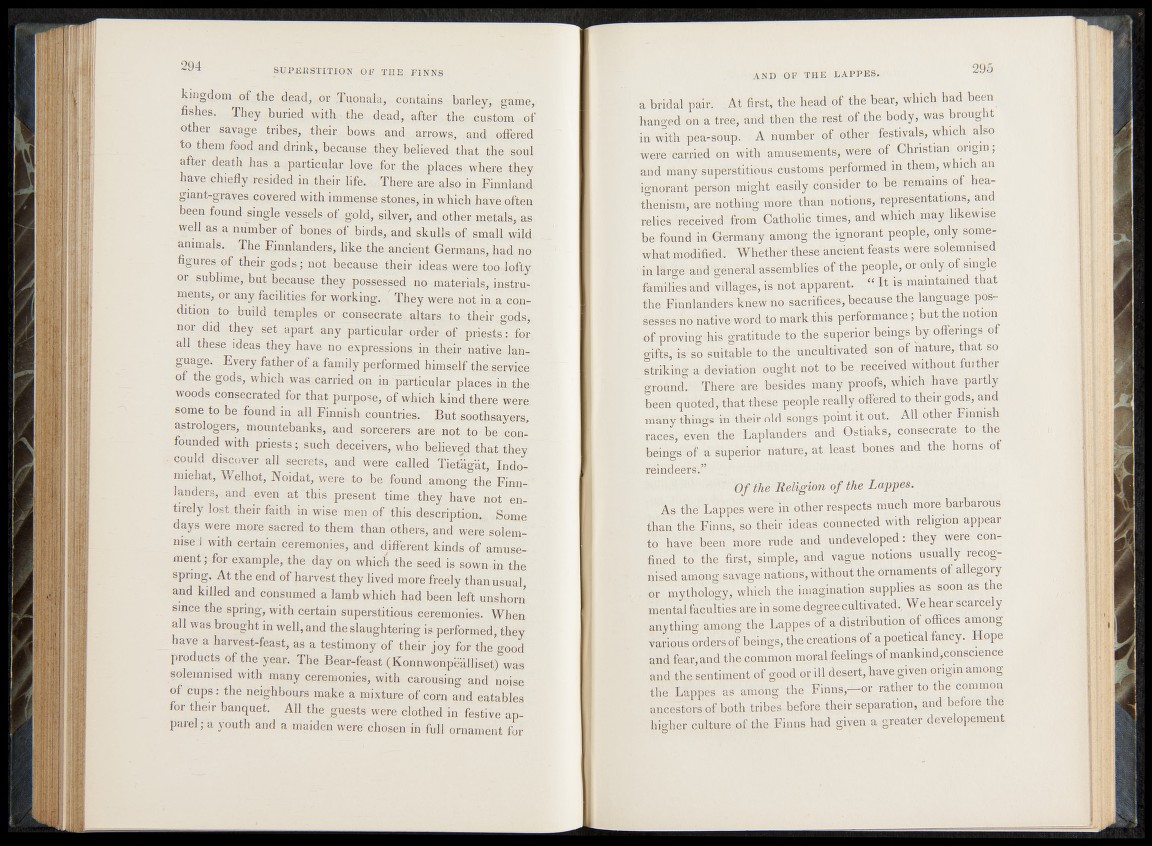
kingdom of the dead, „or Juonala, ,cpntains;rburleyj game,
fishes. Th^^hmded with«The*, ffie< ;^ s tpm Jg&
other savage foriih$9,^heirHbows,and;ra^r©ws, and;offered
to th,em food and drink,, because .they,believed).- that the is.oyl
after.death has a particular J eve </cr the -places, where % y
have chiefly ^regi4ed in , thei^. life. There are also in ffimiland
^lant-grayes^oyemd with immenseatopes,,in which .hayp,often
heen found- single ^ s e j s ,o f . lgx>ld, silver, .and other, metals, as
vrell. as a number of bope^of birds,, and. skull* pf, small:wild
animals. The Fjnnlanders, like the ancient Germans, had no’
figures of their gods ^not x because their ideas werq topJofty
or subljme,, but because jtfiey possessed no materralsji$?t?u-
nients^gr, a n y .fa c ilitie s^ working. ' They, were* nopijpa, condition
tO' build. temples or consecrate* altars to-Theii;i,gprkj.
nor did they,, set, apart any particular\order.,of. prie^ts^ >for5
ajl these ideas.they have no expressions!, in thpisjpattybpianT
guage* Every father of, a family performed himself the,|er;^
of the. goffs, which .wasjqarried o n if f^ n ia u ia ^ p la e e s i the
woods consecrated for that purpose, of which kind there were
snihe.to.be found m all Finnish countries, ^utnoothsayprs,
astrologers, mountebanks, and sorcerers are mot to be ,c.oni
founded with priests; such deceivers, who beliey^dThatJhey
■mould discover all secrets, and were.called Indor
miehat, Welhot, Noidat, .were to <be found among the Finn-
1 anders, and^even at*this .present time ,Iffey>ave . not Un-'
tirely lost, their faith in wise men of this description^/dfome
days were more/sacred to them than others'; and werëlsolein-
nise.d with pertain . ceremonies, and differenflkinds of amusement;
for example, the day on whicli the seed is sown 4n the
spring. At the end of harvest they lived morejfreely than usual,
and killed and consumed a lamb which had been left unshorn
since the spring, with certain superstitious ceremonies. When
all was brought inrwell, and the slaughtering is performed, they
havi a harvest-feast, as a testimony" of their joy for the good
products of the year. The Bear-feast (Konnwnnpealliset) was
solemnised with many ceremonies, with carousing and nojse
of pups: the neighbours make a. mixture Of corn and eatables
for their banquet. All the quests were clothed in festive apparel;
a youth and a maiden were'chosen in full ornament for
a bridwl ^kiri At first, the head of the bear, which had been
bariged;i©ki< a tree; arid»then, the. rest :qfAbe body, was brought
iri? with pha-soup. A number ofdother festivals, which, also
were ca r r ieH ii& am n sem en ts^ fr e^ o f^ .C h r is tia n origin;
and ma4ysupeVstitipustcustoms performed, in them, which an
‘ignorant person mighglftisfly-consider.to 'be remains of hea-
‘thertiSm^fcothihg, m ore,;than -nations*, representations, and
relics^fe'Ceived'from Catholic times, and wffichjnay likewise
hS'found in^G'drmanjr^infiiig^he ignorant,poo,pk,;sojily<§ pm ~
what mOdiffefff- W hM rT h e se’ancientfeasts m m ^olepmised
’in lMrgeiaid^en&iiTassetohlie'alofithe' people, .©Kidply&of single
familiesfand vill^fpismot'^ippafent^=;.’<s It is^rafonTawSd that
the Finrilanders krie^mo sacrifices, be.oause_^e..;lan§aagO;'poS“
sesses'-tfb'^atiile?word ffl foaTk this.performance,;
of p r im |t o s gratitudertO the^tiperipr beings byi offerings,ot
gifts; i-svsb(|iitable to the uncultivated so n ^ f nature, That so
s t r i k i n g devMfen .obght n o t'to be\received without further
ground. T h j f t ate ^besides:many proofs, which have,partly
'beeh qudt'ddVthat tbelepeople really offered'ito theirlgofej and
ma% things Tn t'heiT d ld :so ^ l|sO ih tji^ u t. All' othex.Finhish
yaces,*'CvCn -tWe ^BapTanders and Ostiaks, consecrate to the
bcingstof h slipbrioT' nature, at least bones and the horns of
'reindeers'*!^
” O f the Religion o f the Lappes.-
As the Lapp||Jwe.rerm other respect? much more barbarous
than the Finus,JpTheir ideas connected with religion appear
to have $eep more rudh and undeveloped. they were con
fined'to , the firstSmple, and'V^ghe,notions1 I B y G B H
• nised apmng savage nations, withou| &e ornaments °fLa8 |^ f e
, or mythology^ which the imagination supplies as so^p^s the
mental faculties aj’f in some degree cultivated., Wehear scarcely
anything among tW‘Lapses’» ^ ib u t io m 6 |o ^ b P s among
various order's of b.eings, the creationspf^a poetical fancy. Hope
and fear, and thecommon moralfeelipgs.of mankind^conscience
and the sentiment of gopd or illffpsert, bayegiven origin among
the Lappes as among the Finns,—or rather to the common
ancestors pfihqth tribes; before, their separation,,and before the
higher culture of the Finns had given a greater developement